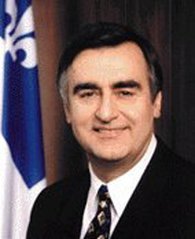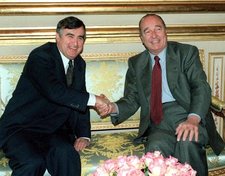Lucien Bouchard
|
|
Lucien Bouchard, born on December 22, 1938 in Saint-Coeur-de-Marie, Quebec, Canada. He is a lawyer, Québec sovereigntist and a politician from Quebec. He was the Leader of Opposition in the Canadian House of Commons from 1993 to 1996), and Premier of Quebec from January 29, 1996 to March 8, 2001).
He is the brother of noted historian Gérard Bouchard, and a recipient of the title of Commander of the French Legion of Honour.
| Contents |
Biography
Origins
Bouchard graduated from Jonquière Classical College in 1959, and obtained a Bachelor's degree in social science and a law degree at Laval University in 1964.
He worked for the federalist Liberal Party of Quebec's campaign of 1970, but became a sovereignist shortly after. This change was the result, in part, of Prime Minister Pierre Trudeau's imposition of martial law during the October Crisis. He was a great admirer of Premier René Lévesque, who later made an habit of quoting Lévesque in speeches.
Bouchard worked with the "Yes" side during the 1980 Quebec referendum on sovereignty. In 1985, he was appointed ambassador to France by Prime Minister Brian Mulroney, a then close friend of his whom he had met in Laval University. He joined Mulroney's Progressive Conservative government in 1988 as Secretary of State and later Minister of the Environment, and served until 1990. While still a strong Quebec nationalist, he converged with Mulroney on the belief that, with a new constitutional arrangement, Quebec's position within Canada could be improved. His stance of the 1980s, endorsing renewed federalism instead of separatism, has been called a symptom of the "Post-Referendum Syndrome" that existed among Quebec nationalists at that time.
Bouchard_&_Parizeau,_Referendum.jpg
Founding the Bloc Québécois
In 1990, Mulroney attempted to amend the Canadian constitution in order to obtain the support of the province of Quebec for it failed. The failure of this "Meech Lake Accord" led to Bouchard's resignation from the PC Party. With a group of dissident MPs from the PC and Liberal parties, Bouchard formed the sovereignist Bloc Québécois. This made Bouchard immensely popular in Quebec.
The Parti Québécois (PQ; the Quebec provincial party in favour of independence) campaigned for the Bloc in the 1993 federal election in order to prepare Québec for sovereignty, according to the Three Periods strategy of PQ leader Jacques Parizeau.
In this election, the Bloc won most of the ridings in Québec: 54 out of 75. Several factors contributed to the Bloc's success:
- popular outrage about the failure of the Meech Lake and Charlottetown Accords to amend the constitution, and resultant rising support for independence,
- Bouchard's popularity,
- the collapse of the PC Party, and
- Liberal leader Jean Chrétien's continued unpopularity in his home province.
Bouchard became the first separatist leader of the Opposition, and headed the Bloc caucus in Parliament from 1993 to 1996.
In December 1994, he lost a leg to necrotizing fasciitis ("flesh-eating disease"), becoming possibly the most famous victim of this rare disease.
Referendum on sovereignty
In 1995, Bouchard signed, as Bloc leader, a tripartite agreement with Parti Québécois leader Jacques Parizeau and Action Démocratique leader Mario Dumont, which mapped the way to the referendum on independence. Faithful to René Lévesque's beliefs, he was instrumental in convincing Parizeau of including a plan of association with Canada in the referendum question. He campaigned with the other two leaders for the Yes side. Québec premier Jacques Parizeau first led the Yes campaign but, as support for sovereignty began to reach a plateau, the more popular Bouchard was given the official leadership.
A charismatic, efficient and poetic wordsmith, his popularity was increased by his departure from the government and by the rescue from disease.
The referendum gathered support of 49.42 per cent of the electorate, a feat often attributed to Bouchard personally, although it is disputed.
Premier of Québec
After the Yes side lost the 1995 referendum, Parizeau resigned as Québec premier. Bouchard resigned his seat in Parliament in 1996, and became the leader of the Parti Québécois and premier of Québec.
On the matter of sovereignty, while in office, he stated that proper circumstances, the conditions gagnantes (winning conditions), would have to be in place before holding another referendum. During his presence as leader of government, these conditions did not arise, and no referendum was held. A main concern of the Bouchard government, also considered part of the conditions gagnantes, was economic recovery through the achievement of "zero deficit". Long-term keynesian policies resulting from the "Quebec model", implanted by both PQ governments in the past and the previous Liberal government had left a substantial deficit in the provincial budget. The deficit was eliminated in 1999, one year earlier than anticipated, despite substantially increased public spending under the governance of his successor, Bernard Landry.
Nevertheless, the provincial finances are prognosticised to remain a major problem over the next decades, notably due to rising costs in health care, debt repayment, aging population, strong unionization of the workforce, the highest tax rate on the continent, and growing demands for increased services by citizens and various lobby groups, despite the global relative poverty of Quebec compared to Canada and the US. (Quebec is Canada's poorest province as measured by Gross Interior Product per capita, after the Maritime Provinces.) Bouchard's financial restructuration is widely considered a first cornerstone step to solve Quebec's financial problems.
Retirement
Bouchard retired from politics in 2001, and was replaced as Québec premier by Bernard Landry. He stated that his failure to revive the sovereignist flame was a cause of his departure, something he took responsibility for in a poignant farewell speech. Others have speculated that the Michaud Affair, regarding allegedly anti-semitic comments by Parti Quebecois candidate Michaud, was another factor favouring Bouchard's departure. Bouchard, considered a moderate on the sovereignty issue than traditional PQ premiers, also faced criticism by the hard liners of his own party for failing to engage the province in a third referendum on sovereignty in the course of his mandate, six years after the second one.
Since then, he has begun a law practice again, and kept a very low public profile, almost never commenting on politics or public affairs. He is married to Audrey Best (born 1960), a California-born airline stewardess he met on an international flight. They have two children, Alexandre and Simon.
Legacy
His government implemented some controversial policies, including cuts to the province's health care spending in order to balance the chronically and critically deficitary provincial budget, and the amalgamation of Quebec's larger cities undertaken by his successor Bernard Landry. Also, some have criticized him for not pushing forward on the sovereignty issue during his time in office. These hard line purs et durs ("pure and tough") independentists were a problem for his leadership, notably due to the strongly decentralised structure of the Parti Quebecois. More widely acclaimed aspects of his legacy include the creation of a low-cost, universal public daycare system, the birth of Emploi Québec, lowered unemployment rates, a resurgent Québec economy, and achieving a balanced budget. He is remembered for his sometimes "short fuse" when provoked, but also for his charms, eloquence and culture, and was appreciated as a gentleman by his political adversaries, and was considered favourably by many amongst Quebec's ethnic minorities and anglophone and Jewish communities.
Quotes
- More than ever, it will be imperative to remind all that the sovereignist way is one of generosity, of tolerance, and openness. (listen)
- "Plus que jamais, il faudra rappeler que la démarche souverainiste en est une de générosité, de tolérance, et d'ouverture."
- The Quebec people possesses all the assets to achieve an enviable place in the concert of nations (i.e., the international community). At the only condition of repatriating all of its public resources, rather than dispersing them on two conflicting fronts. (listen)
- "Le peuple québécois possède tous les atouts pour se tailler une place enviable dans le concert des nations. À la seule condition de rapatrier toutes ses ressources publiques, plutôt que de les disperser sur deux fronts conflictuels."
Elections as party leader
He won the 1998 election and resigned in 2001.
See also
- Politics of Quebec
- List of Quebec premiers
- List of Quebec general elections
- Timeline of Quebec history
- Nicknames of Quebec premiers
- Sovereignty Association
- History of the Quebec sovereignist movement
- Politics of Canada
- List of Canadian federal elections
External links
- National Assembly biography (http://www.assnat.qc.ca/fra/membres/notices/b/BOUCL.htm) (in French)
| Preceded by: Jacques Parizeau | Premier of Quebec 1996-2001 | Succeeded by: Bernard Landry |
| Preceded by: Jean Chrétien | Leader of the Opposition in Canada 1993-1996 | Succeeded by: Gilles Duceppe |
| Preceded by: none | Leader of the Bloc Quebecois 1990-1996 | Succeeded by: Gilles Duceppe |
| Preceded by: Clément Coté, Prog. Cons. | Member of Parliament from Lac-Saint-Jean 1988-1996 | Succeeded by: Stéphan Tremblay, B.Q. |
| Preceded by: Jacques Parizeau | Leader of the Parti Quebecois 1996-2001 | Succeeded by: Bernard Landry |


